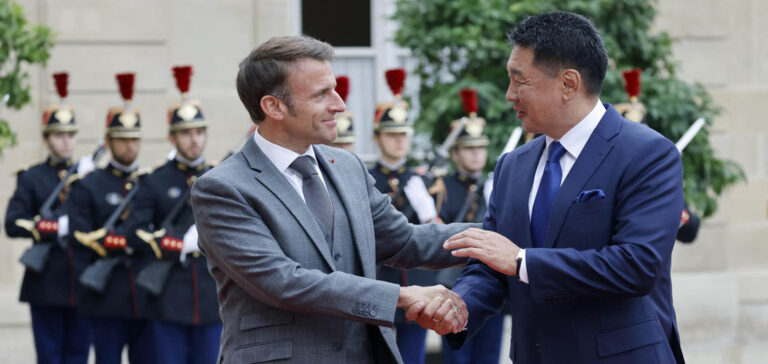An agreement between France and Mongolia was approved by Mongolian President Ukhnaa Khurelsukh in Paris. The project involves the operation of a major uranium mine. It’s worth noting that Khurelsukh’s reception in Paris was grandiose, with red carpet, Republican Guard and a banquet at the Élysée Palace. Which underlines the importance of this state visit.
In May, at a meeting in Ulan Bator, French President Emmanuel Macron spoke out in favor ofOrano. The latter is already present in Mongolia and is bidding to extract one of the world’s largest uranium mines. This agreement is therefore a significant step towards the realization of this project.
A promising partnership
Despite global geopolitical challenges, France and Mongolia have succeeded in building a strong partnership. It is based on sovereignty and democratic values. This partnership aims to exploit the resources identified in Mongolia, particularly the critical metals at the heart of the energy transition. Both countries are committed to the highest environmental and social standards.
Orano and the Mongolian government have signed a protocol for the development of the Zuuvch-Ovoo mine, which could account for up to 4% of the world’s uranium production. The project is praised for its role in diversifying Orano’s mining activities. France sees this project as a significant opportunity to increase its presence on the world uranium scene.
Uranium is an essential element in the production of nuclear energy. Uranium plays a crucial role in providing clean electricity and reducing carbon emissions. What’s more, global demand for low-carbon energy is growing. As a country rich in natural resources, Mongolia has vast uranium deposits, making it a strategic partner for France, which aims to strengthen its position in the nuclear energy sector.
Environmental and economic challenges
The agreement between France and Mongolia has significant environmental and economic implications. From an environmental point of view, it is crucial to note that this agreement comes with a firm commitment to the highest environmental standards. Both countries are determined to exploit resources responsibly and minimize environmental impact.
In a global context where the energy transition has become an absolute priority in the fight against climate change, uranium is becoming a strategic element. Nuclear power plants provide a clean, efficient source of energy, reducing dependence on fossil fuels. Consequently, responsible mining of uranium deposits is crucial to support the transition to a low-carbon economy.
In economic terms, this agreement opens up new opportunities for France and Mongolia. France, already a key player in the global nuclear sector, is strengthening its position as a trusted partner for uranium-rich countries. The expansion of Orano’s mining activities in Mongolia strengthens its ability to meet growing demand for uranium.
For Mongolia, this agreement is an opportunity to boost its economy by developing a promising uranium mining sector. The exploitation of uranium deposits can generate significant revenues for the country, contributing to its economic growth and development. As a landlocked country between China and Russia, Mongolia is also seeking to diversify its economic partnerships and strengthen its position on the international stage.
Strengthening diplomatic relations
In addition to the economic and environmental benefits, this agreement strengthens diplomatic relations between France and Mongolia. France sees Mongolia as a key partner in the region, offering this landlocked country between two giants, China and Russia, an opportunity to strengthen its strategic sovereignty.
Mongolia, for its part, sees France as its “third neighbor” in Europe, in addition to its relations with China and Russia. This diversified partnership enables Mongolia to forge close links with other European capitals, strengthening its diplomatic position on the world stage.
In conclusion, the agreement between France and Mongolia for the operation of the Zuuvch-Ovoo uranium mine is an important milestone in the field of nuclear energy and international relations. It reflects the growing importance of critical metals, the commitment to energy transition and the desire to strengthen economic and diplomatic partnerships. This agreement offers substantial benefits for both countries and contributes to the global fight against climate change.
Why should it matter to you? This historic agreement between France and Mongolia to develop a uranium mine has major implications for global uranium production, the energy transition and international relations. It reflects the growing importance of critical metals in the global energy transition, and is an example of a strong partnership between two countries committed to preserving the environment and promoting democracy.






















